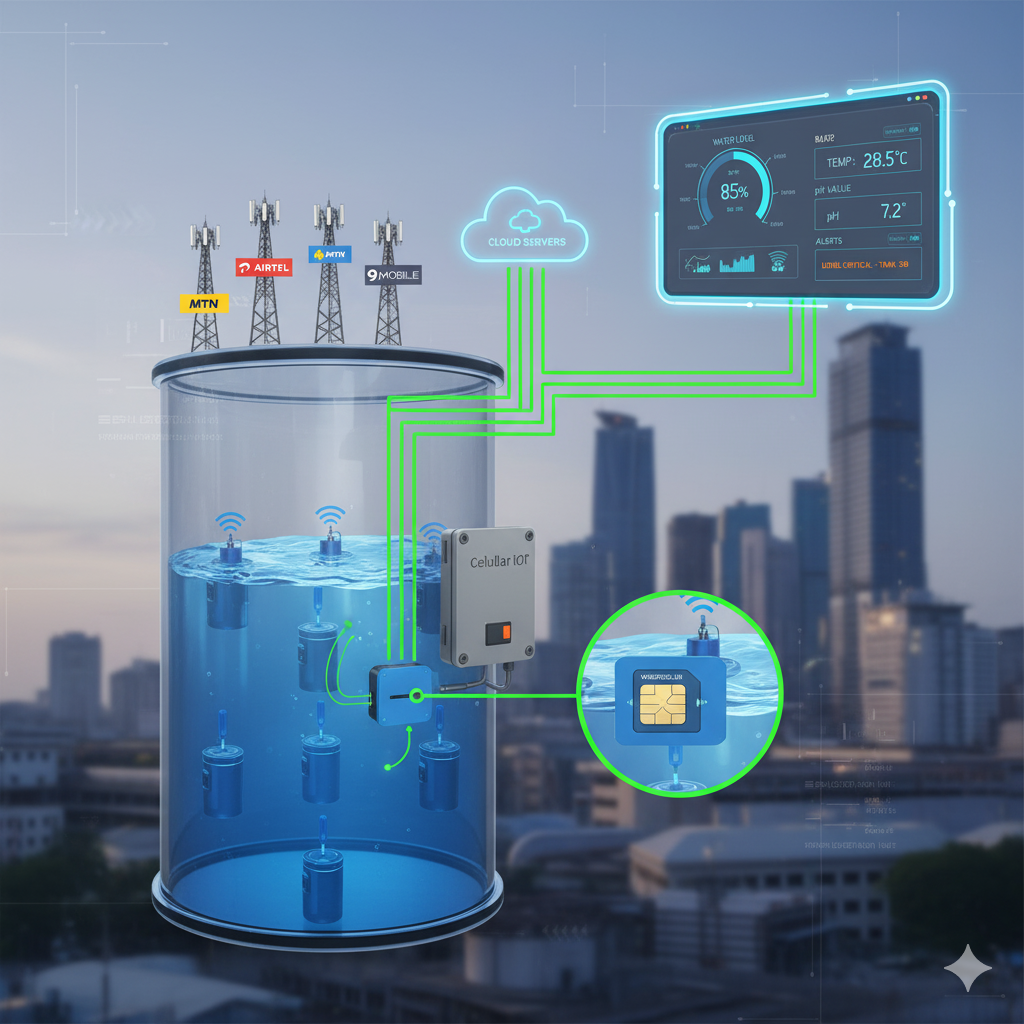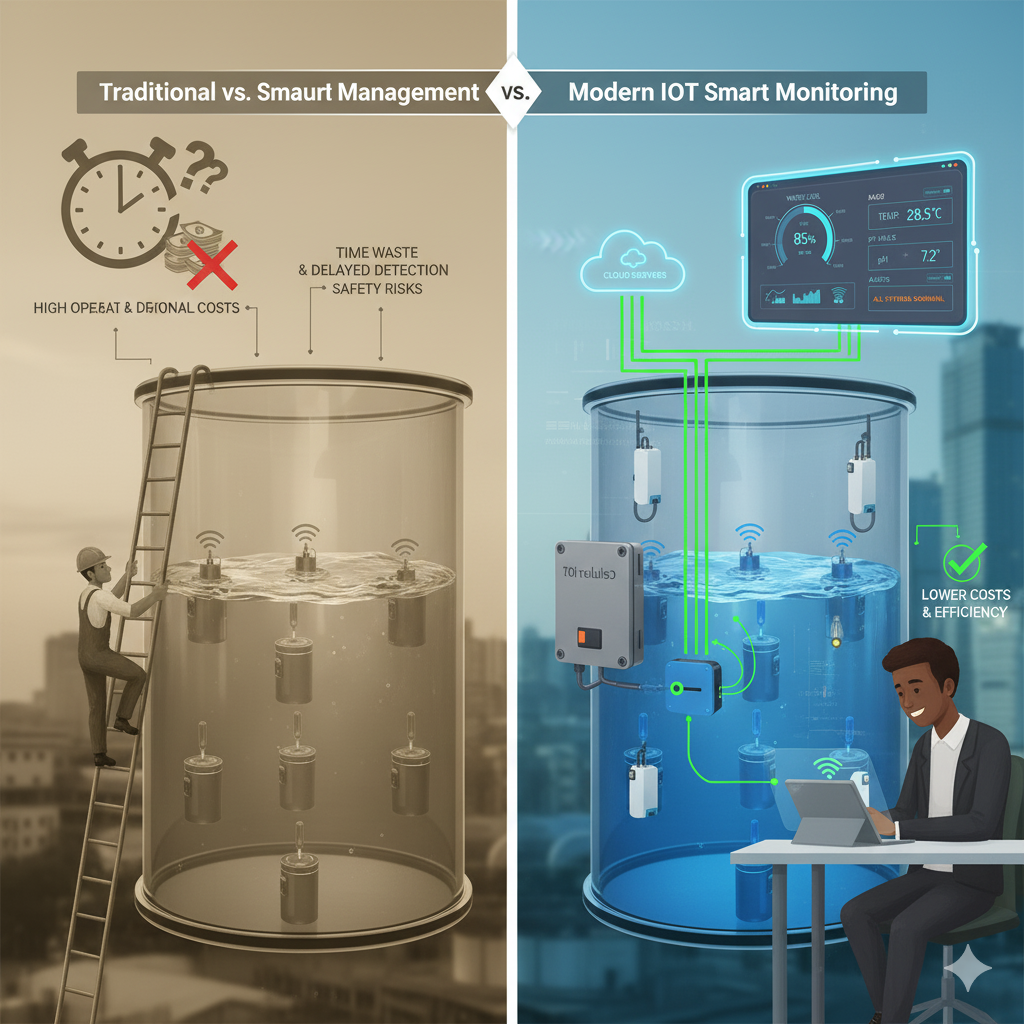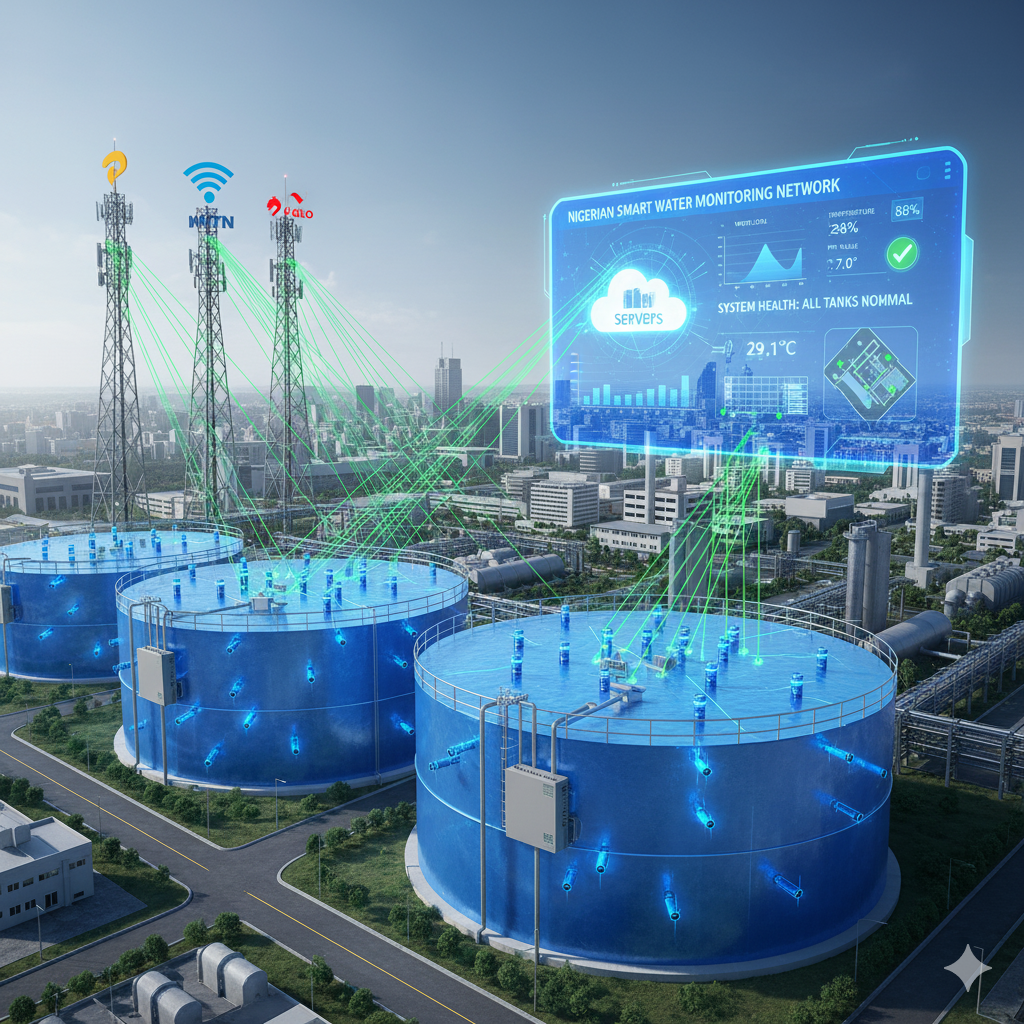Introduction: Nigeria’s Water Management Challenge
Water represents an essential resource for human survival, yet only around 1% of Earth’s water is freshwater available for consumption. Furthermore, this water must be carefully conserved because while renewable, it remains finite. Subsequently, this presents a global challenge in preserving water for drinking, agriculture, and manufacturing for current and future generations. Therefore, IoT smart water tank monitoring has become crucial for Nigerian businesses and municipalities.
According to the Food and Agriculture Organization (FAO), water consumption has been growing at more than twice the rate of population increase in the last century. Moreover, this trend pushes more regions close to the limit at which usable water can be sustainably delivered. By 2025, 1.8 billion people are expected to be living in regions with “absolute” water scarcity.
Nigerian cities including Lagos, Abuja, and Port Harcourt face increasing water management challenges from population growth, industrial demand, and infrastructure limitations. Additionally, agriculture and farming consume around 70% of the world’s freshwater, making efficient water management critical for Nigerian agricultural operations. Consequently, IoT smart water tank monitoring provides solutions for these pressing challenges through real-time tracking, automated alerts, and data-driven water management.
These trends have resulted in steady growth of water tank installations across Nigeria for potable water storage, rainwater collection, irrigation, construction, and industrial applications. Furthermore, the volume and diversity of water tanks creates significant opportunities for IoT connectivity solutions enabling smarter resource management.
1. What is Smart Water Monitoring?
Defining Smart Water Systems
IoT smart water tank monitoring refers to the use of connected sensors and IoT devices to track water levels, quality parameters, and usage patterns in storage tanks. Furthermore, these systems leverage cellular IoT Nigeria connectivity to transmit real-time data from remote or distributed water tanks to centralized management platforms accessible via web browsers and mobile applications.
Traditional water tank management requires manual inspection, creating inefficiencies and increasing risks of overflows, shortages, or quality issues going undetected. However, smart monitoring systems eliminate these limitations through continuous automated tracking and intelligent alerting when parameters exceed acceptable ranges.
Smart water monitoring systems consist of several integrated components working together. Subsequently, submersible sensors measure water levels, pressure, temperature, and quality parameters. These sensors connect to IoT gateways or cellular modems equipped with roaming SIMs enabling data transmission across Nigerian telecommunications networks.
Data flows from sensors through universal SIM connectivity to cloud-based management platforms where algorithms analyze information, identify anomalies, and generate alerts. Additionally, dashboard interfaces provide real-time visibility into tank status across multiple locations while historical data enables trend analysis and predictive maintenance.
The Nigerian Communications Commission increasingly recognizes IoT applications for water management as essential infrastructure supporting sustainable development goals. Moreover, regulatory frameworks continue evolving to facilitate rather than hinder smart water monitoring deployments across public and private sectors.

2. Water Storage Challenges in Nigeria
Infrastructure and Demand Pressures
Nigeria faces unique water storage challenges stemming from rapid urbanization, population growth, and infrastructure limitations. Furthermore, unreliable public water supply in many areas forces businesses, institutions, and residences to maintain private water storage tanks for operational continuity and daily needs.
Lagos alone has an estimated 2.5 million private water tanks across residential, commercial, and industrial properties. Additionally, these tanks vary dramatically in size, location, and usage patterns, creating complex management challenges. Subsequently, tank owners struggle to maintain optimal water levels, prevent contamination, and identify leaks or unauthorized usage.
Quality and Safety Concerns
Water quality represents a critical concern for Nigerian water storage systems. Tanks exposed to high temperatures, contamination from improper maintenance, or extended storage periods can develop bacterial growth, chemical alterations, or sediment buildup affecting water safety and usability.
Poor water quality can lead to health issues including digestive problems and skin conditions. Moreover, there are increasing reports of waterborne illnesses linked to improperly maintained storage systems. Therefore, continuous monitoring of quality parameters proves essential for protecting public health and ensuring regulatory compliance.
Cost and Efficiency Issues
Manual water tank management incurs significant labor costs while delivering poor visibility into actual water usage patterns and storage efficiency. Furthermore, tank overflows waste valuable water resources while shortages disrupt operations and require expensive emergency refilling services.
Nigerian businesses report average water management costs of ₦2.3 million annually per facility for manual monitoring, emergency refills, and water quality testing. Additionally, these costs don’t account for operational disruptions from unexpected water shortages or quality issues requiring system shutdowns.

3. IoT Smart Water Monitoring Solutions
Advanced Sensor Technologies
Battery-operated IoT submersible sensors, ruggedized and IP-rated (such as IP69 waterproofing), deliver near real-time updates tracking even small changes in tank water levels. Furthermore, with battery life extending up to a decade, these sensors enable long-lasting performance without requiring frequent maintenance or battery replacement.
Modern sensors monitor multiple parameters simultaneously including fluid level, pressure, pH levels, temperature, Total Dissolved Solids (TDS), Oxidation-Reduction Potential (ORP), salinity, conductivity, and free chlorine levels for contaminant neutralization. Additionally, this comprehensive monitoring ensures both quantity and quality management for Nigerian water storage systems.
The sensors connect via cellular IoT networks using multinetwork SIM technology from providers like Genyz Solutions. Subsequently, this connectivity enables data transmission across MTN, Airtel, Glo, and 9mobile networks, ensuring reliable communication regardless of location-specific coverage variations.
Data Management Platforms
Cloud-based management platforms aggregate data from distributed sensors, providing centralized visibility across multiple tanks and locations. Furthermore, these platforms incorporate sophisticated algorithms analyzing usage patterns, identifying anomalies, and predicting maintenance requirements before failures occur.
Real-time dashboards display current status for all monitored tanks including water levels, quality parameters, and alert conditions. Additionally, historical data visualization enables trend analysis supporting strategic planning for water resource management and infrastructure investments.
Mobile applications extend monitoring capabilities to field personnel and decision-makers, enabling remote access to critical water management information. Moreover, customizable alert configurations ensure appropriate personnel receive timely notifications via SMS, email, or push notifications when intervention becomes necessary.
Connectivity Infrastructure
Successful IoT smart water tank monitoring requires robust connectivity infrastructure supporting reliable data transmission from remote or distributed locations. Furthermore, universal SIM solutions prove essential for Nigerian deployments where single-carrier approaches fail to provide consistent coverage across diverse operational environments.
Genyz Solutions specializes in M2M connectivity Africa solutions optimized for water monitoring applications requiring cost-effective, reliable data transmission across challenging African telecommunications infrastructure. Additionally, our SIM management platform enables centralized connectivity management across thousands of monitoring points.
4. Benefits of Smart Water Tank Monitoring
Improved Operational Efficiency
Smart water monitoring eliminates the need for manual tank level checks, reducing labor costs while improving data accuracy. Furthermore, automated monitoring operates continuously without human intervention, capturing information that manual inspection schedules would miss entirely.
A Lagos manufacturing facility implementing IoT smart water tank monitoring reduced water management labor costs by ₦1.8 million annually while simultaneously improving monitoring frequency from twice-daily manual checks to continuous real-time tracking. Additionally, this improvement enabled early detection of issues previously discovered only during scheduled inspections.
Significant Cost Savings
Remote monitoring of water tank levels allows Nigerian businesses to optimize water deliveries, avoid emergency refills at premium prices, and reduce waste from overflows or leaks. Furthermore, predictive insights enable proactive maintenance preventing costly equipment damage from contaminated water or system failures.
A Nigerian hotel chain with properties across Lagos, Abuja, and Port Harcourt implemented smart water monitoring achieving ₦12.4 million annual savings through optimized water procurement, reduced waste, and prevented equipment damage. Moreover, the system delivered full ROI within 14 months while establishing infrastructure supporting future expansion.
Enhanced Safety
Remote tank level monitors reduce the need for staff to climb tanks or enter confined spaces for inspection purposes. Furthermore, this proves particularly important in industrial environments where tank access presents significant safety risks including falls, confined space hazards, and exposure to chemicals or contaminants.
Automated monitoring also improves water safety by continuously tracking quality parameters and alerting managers immediately when contamination risks emerge. Additionally, this proactive approach prevents health issues from consuming compromised water that manual testing schedules might miss.
Environmental Protection
By monitoring tank levels for overflows and leaks, organizations identify and reduce water waste impacting the environment. Furthermore, this conservation proves increasingly important as Nigerian water resources face mounting pressure from population growth, industrial demand, and climate variability.
Smart monitoring enables precise tracking of water consumption patterns, supporting sustainability reporting and environmental compliance requirements. Moreover, data-driven insights help organizations optimize water usage, reducing environmental footprint while maintaining operational effectiveness.
5. Nigerian Use Cases and Applications
Municipal Water Management
Nigerian municipalities use IoT smart water tank monitoring to track levels in public water storage tanks serving residential sectors. Furthermore, this ensures adequate water supply for daily needs while maintaining reserves for periods of high demand or emergencies.
The Lagos State Water Corporation implemented smart monitoring across 156 public water tanks, achieving 94% reduction in overflow waste and 67% improvement in supply reliability. Additionally, real-time visibility enabled optimized water distribution scheduling reducing operational costs by ₦34 million annually.
IoT monitoring prevents overflows and underflows while enabling leak detection and water quality tracking to prevent contamination. Moreover, predictive analytics forecast demand patterns helping municipalities plan infrastructure investments and maintenance schedules more effectively.
Agricultural Applications
Nigerian farmers use tank monitoring systems for irrigation water management and livestock drinking water supplies. Furthermore, smart monitoring ensures adequate water availability for crops and animals while preventing waste from overflows or undetected leaks.
A large farming operation in Kano State deployed IoT monitoring across 48 irrigation tanks using universal SIM connectivity from Genyz Solutions. Subsequently, the system reduced water waste by 41% while improving crop yields by 23% through optimized irrigation scheduling based on actual water availability and usage patterns.
Smart monitoring also enables farmers to track fertilizer and pesticide storage tank levels, ensuring appropriate application rates while preventing environmental contamination from improper chemical storage or accidental releases.
Industrial and Commercial Applications
Nigerian industries including manufacturing, food processing, and chemical production rely on water storage for operations. Furthermore, IoT smart water tank monitoring ensures consistent water availability while tracking quality parameters affecting production processes and equipment longevity.
A Kaduna textile manufacturer implemented smart monitoring for 12 water tanks supporting production operations. The system reduced unplanned production interruptions from water issues by 78% while decreasing water-related equipment maintenance costs by ₦5.6 million annually through early detection of quality problems.
Banking institutions partnered with FCMB and Wema Bank use IoT monitoring for water systems supporting data centers and branch operations where reliable water supply proves essential for cooling systems and operational continuity.
6. Implementation Guide for Nigerian Businesses
Assessment and Planning
Successful implementation begins with comprehensive assessment of water storage infrastructure, usage patterns, and monitoring requirements. Furthermore, businesses should evaluate tank locations, access challenges, power availability, and cellular coverage affecting sensor deployment and connectivity reliability.
Cost-benefit analysis comparing manual monitoring expenses against IoT system costs typically reveals positive ROI within 12-24 months for most Nigerian applications. Additionally, analysis should account for indirect benefits including improved safety, environmental protection, and operational insights enabling strategic improvements.
Regulatory compliance review ensures monitoring systems meet Nigerian Communications Commission requirements and water quality standards established by relevant authorities. Moreover, proper planning addresses data security, privacy considerations, and integration with existing management systems.
Technology Selection
Choosing appropriate sensors, connectivity solutions, and management platforms requires evaluation of specific operational requirements and environmental conditions. Furthermore, Nigerian deployments must account for temperature extremes, water quality variations, and connectivity challenges affecting system performance and reliability.
Sensor selection should prioritize ruggedized designs with appropriate IP ratings for submersion and environmental exposure. Additionally, battery life, measurement accuracy, and multi-parameter capabilities affect long-term operational costs and monitoring effectiveness.
Connectivity infrastructure must support reliable data transmission across diverse Nigerian locations. Therefore, universal SIM solutions from Genyz Solutions provide optimal connectivity through automatic switching between MTN, Airtel, Glo, and 9mobile networks based on coverage and performance.
Deployment Best Practices
Phased implementation reduces risk while enabling learning and optimization before full-scale deployment. Furthermore, pilot programs validate sensor performance, connectivity reliability, and platform functionality in actual operational conditions before organization-wide rollout.
Professional installation ensures proper sensor positioning, secure connectivity infrastructure, and correct system configuration. Additionally, comprehensive testing confirms accurate measurements, reliable data transmission, and appropriate alert configurations before transitioning to operational monitoring.
Training programs prepare operational teams to use monitoring platforms effectively, interpret data correctly, and respond appropriately to alerts. Moreover, ongoing support from providers like Genyz Solutions ensures technical issues receive prompt resolution while system optimization continues throughout operational lifecycle.
7. Future Trends in Nigerian Water Management
Advanced Analytics Integration
Artificial intelligence and machine learning integration will enhance IoT smart water tank monitoring capabilities through predictive analytics, anomaly detection, and automated optimization. Furthermore, these technologies will enable Nigerian businesses to anticipate water management challenges before they impact operations.
Predictive models analyzing historical usage patterns, seasonal variations, and external factors will forecast future water requirements with increasing accuracy. Additionally, automated optimization algorithms will recommend actions maximizing water efficiency while minimizing operational costs.
Integration with Smart City Initiatives
Nigerian smart city developments in Lagos, Abuja, and other urban centers will incorporate water management as essential infrastructure components. Furthermore, IoT monitoring will integrate with broader city management platforms enabling coordinated resource management and infrastructure planning.
Digital twin models of urban water infrastructure will leverage IoT monitoring data for scenario planning, infrastructure optimization, and emergency response preparation. Moreover, these advanced applications will support sustainable urban development addressing Nigeria’s rapid urbanization challenges.
Regulatory Evolution
The Nigerian Communications Commission and water regulatory authorities continue developing frameworks supporting IoT applications for water management. Furthermore, evolving standards will provide clearer guidance for system deployments while ensuring security, privacy, and operational transparency.
Government initiatives promoting sustainable water management will create incentives for IoT monitoring adoption across public and private sectors. Therefore, businesses implementing smart monitoring today position themselves advantageously for future regulatory requirements and potential incentive programs.
Conclusion: Transform Nigerian Water Management
IoT smart water tank monitoring represents a transformative solution for Nigerian water management challenges affecting municipalities, businesses, and agricultural operations. Furthermore, the technology delivers measurable benefits including cost reduction, operational efficiency, enhanced safety, and environmental protection.
Success requires partnering with connectivity providers combining technical expertise with deep understanding of Nigerian telecommunications infrastructure and water management challenges. Moreover, Genyz Solutions offers universal SIM connectivity, comprehensive technical support, and proven experience supporting successful IoT deployments across Nigeria and Africa.
Start Your Smart Water Monitoring Journey
Contact Genyz Solutions today for comprehensive consultation on IoT smart water tank monitoring solutions, universal SIM connectivity, and implementation strategies tailored to your Nigerian operations.

